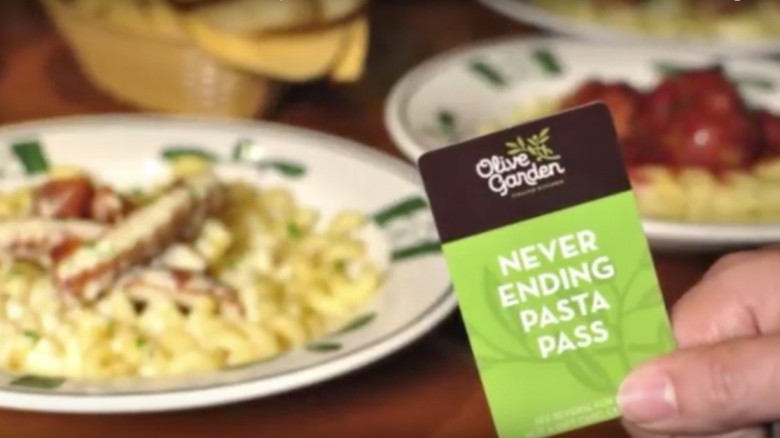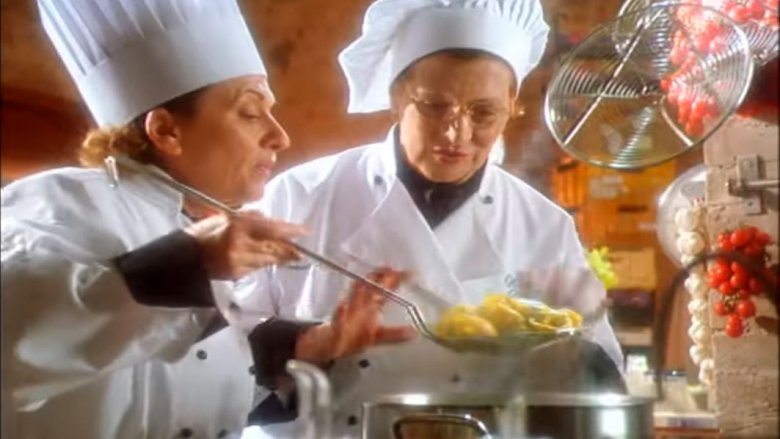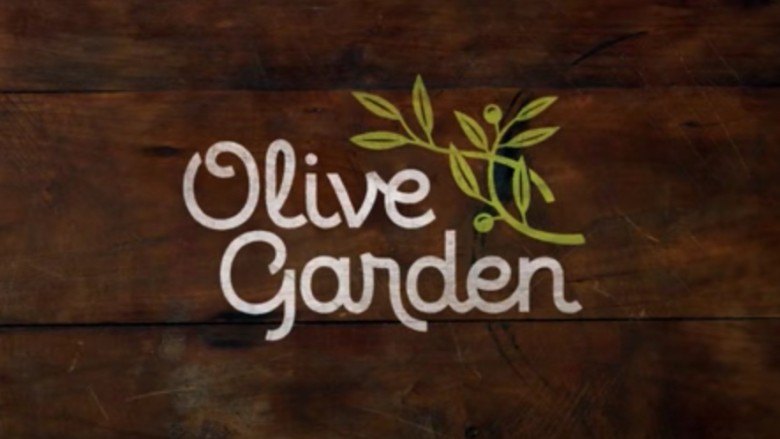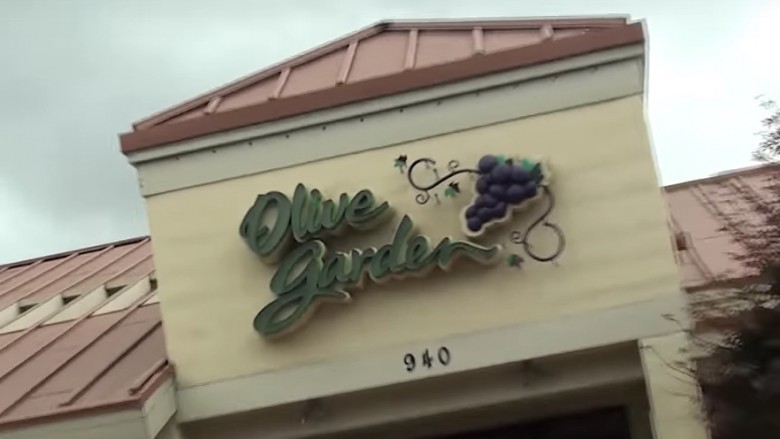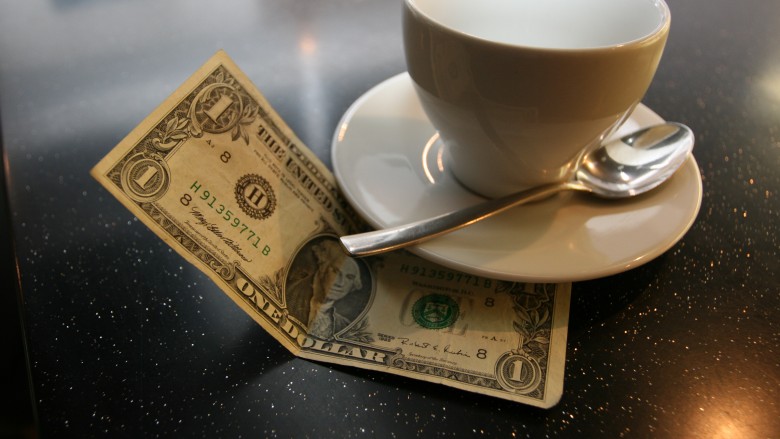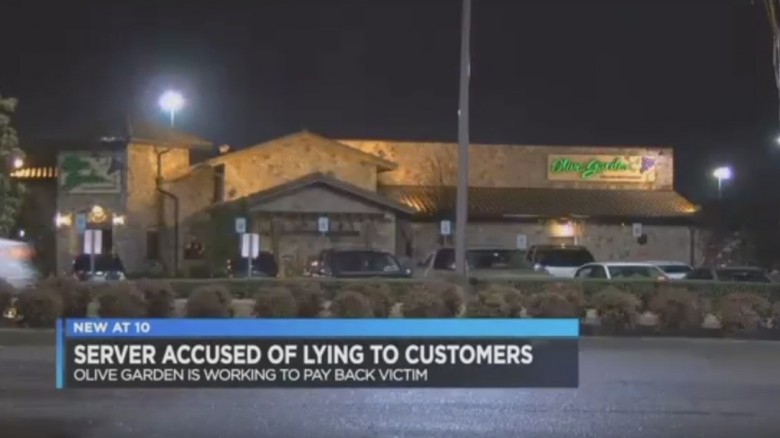Secrets That Olive Garden Doesn't Want You To Know
General Mills gave birth to Olive Garden in 1982 but it became an independent company under the Darden name in 1995. And although at one time it was a booming business, offering customers a taste of Italy at a price they could afford, now it just stands for relatively affordable if poorly executed food that leaves a bad taste in your mouth. As far as most customers are concerned, however, the problem with Olive Garden ends at the bill and is forgotten the next day. And that suits OG just fine. Because if it ever occurred to most customers to look past the cheap pseudo-Italian decor, they might stumble upon a few secrets Olive Garden didn't want them to know.
Never-ending pasta becomes a never-ending problem for Olive Garden
Sometimes a great idea can be ruined by poor execution, and although plenty of people have been taught that lesson by Olive Garden's kitchen, it took a never-ending pasta promotion for Olive Garden to learn the lesson itself. The idea was a pretty good one: offer 1,000 never-ending pasta passes to the public for the ridiculously low price of $100. For those 1,000 lucky pasta lovers, they could eat all the pasta they wanted for seven weeks. Unfortunately when the sale was done (in under 45 minutes), there were 1,000 voices shouting for joy and considerably more shouting for blood. The problem arose when Olive Garden announced that the passes would be available on their website at 3 p.m. but the website was swamped and promptly crashed before the magic hour even arrived. It recovered in time for the sale to start, but for most people that involved watching the site crash again as they tried to complete the order.
According to an Olive Garden spokeswoman, the website received 500,000 visitors in the first 30 minutes. But since only 1,000 of them successfully guaranteed themselves seven weeks of unlimited regret, that leaves 499,000 customers successfully alienated in just 30 minutes. But not all the winners ran straight to a pasta-filled paradise: they went straight to Ebay. More than 50 were up for auction by the following day, with some bids getting close to $400.
Olive Garden had a norovirus outbreak
The quality of Olive Garden's food won't be setting the world on fire anytime soon, but it's cheap enough that most customers don't mind. But if it sets customer's stomachs on fire instead, that would probably tip the balance. For one Indianapolis Olive Garden in 2006, that became an unfortunate reality when the meals of at least 373 customers were served with an unwanted return ticket.
Norovirus is a particularly contagious virus that causes vomiting and diarrhea, among other unpleasant reasons to miss work. If you thought contracting the bug was reason enough to regret a meal, then you didn't know that norovirus is often spread by eating food tainted with the feces or vomit of another infected person. As soon as the Olive Garden was identified as the source of the outbreak, it was closed and scrubbed. But if its employees had just been more enthusiastic about scrubbing themselves, the whole ordeal could have been avoided.
Olive Garden's Tuscan cooking school is more like a summer camp
In an attempt to claim some level of Italian authenticity, Olive Garden announced the existence of its Culinary Institute of Tuscany, where the best chefs in the chain are sent to learn the secrets of Italian cuisine. It seems like a great idea, and it would be if it were real. Unfortunately, according to a Redditor claiming to be a former manager of Olive Garden and an attendee of the institute, what was presented as a serious attempt to improve quality is really little more than a staff getaway and promotional tool.
The location doesn't even belong to Olive Garden, but is instead a bed and breakfast they rent in the offseason for a few weeks. Attendees go on a few tours, speed through a few classes on herbs and dishes, and have a photo taken with the chef for their local papers back home. Sending staff on an all-expenses-paid trip to Italy is nothing to sneer at, and Olive Garden should probably be applauded for caring enough to do it. But after spending a week in the Italian countryside eating actually authentic Italian cuisine and drinking real Italian wine, stepping back into the distorted corporate Italian fantasy that is an Olive Garden restaurant must be soul-destroying.
Rebranding made Olive Garden worse
Olive Garden, like many "casual dining" restaurants, has seen a steady decline in sales over the last few years. So the bosses at Olive Garden put their heads together and decided that what the company really needed was not better food or better service, but rather an ill-advised and unnecessary makeover. Admittedly the old green script on a stucco textured background was looking a bit kitschy, but it was at least distinctive and it was far from the worst thing about the place.
The replacement was remarkable for being totally unremarkable, and it didn't go unremarked upon, least of all by the stock market. The value of the stock of Olive Garden's parent company dropped by 5 percent on the day the new logo was revealed. They might just as well have decided to reshoot the photographs of the food for the menu: the actual food coming out of the kitchen would still look like garbage, but at least it would have cost less and most people wouldn't have cared enough to notice.
Olive Garden tried to make more workers part-time to cut costs
In 2012 the Affordable Care Act was two years old and not yet running on all cylinders. Different parts of the act were coming into force at different times, and one particular part, the employer mandate, would be one of the last. The employer mandate requires employers of over 50 workers to provide health insurance to anyone working full-time (defined as more than 30 hours a week) or face a tax penalty. And even with two years to go before it would become law, Darden Restaurants, the owner of Olive Garden, was getting worried. At that time Darden employed around 185,000 people, of which nearly 50,000 were considered full-time, so Darden would eventually have to spend some money. But there was a loophole. Since the law only applied to employees working more than 30 hours, the cost of providing health care could be reduced by cutting existing employees' hours below the 30-hour limit.
At some restaurants in four market areas, Olive Garden tried shifting their staffing levels away from full-time staff and toward more part-time staff. Results were not positive: internal surveys determined that satisfaction among both employees and customers was down at the testing locations. A couple months after the tests were announced, Darden reported that it wouldn't be cutting any full-time staff down to under 30 hours a week. However, since the business has a staff turnover of around 50 percent per year, it didn't rule out hiring more part-time workers in the future as full-time staff leave. Same result, just a little bit slower.
Olive Garden asked an on-duty police officer to leave because he was carrying a gun
With concealed-carry laws spreading across the nation, and more and more people venturing out into public with a firearm, it's not a particular surprise that some businesses have chosen to post signs prohibiting those people from carrying guns onto their property. Olive Garden, however, is not one of them. That makes the experience of Kansas City police officer Michael Holsworth doubly surprising.
According to a Facebook post he published after the incident, he said he entered an Olive Garden restaurant in Independence, Missouri, in 2015 intending to meet his family for lunch. But he hadn't been there long before he was approached by a member of staff and informed that guns weren't allowed in the restaurant. Officer Holsworth was on-duty and wearing his uniform, and he initially thought the employee was joking. But it turned out she was deadly serious, and he ended up leaving the restaurant. After the officer posted about his experience on Facebook, the public backlash was swift, particularly from cops and concealed-carry supporters. Olive Garden wasn't slow to defend itself and offer a swift apology to Holsworth, but the damage was done. It's a pity because Olive Garden can't really afford to anger any more customers, least of all the armed ones.
Olive Garden was slammed by its own shareholders
Any business has to expect some constructive criticism every now and again; it's pretty much inevitable. But at least when it does come it's from strangers...usually. That is unless you're Olive Garden because then the criticism comes from a little closer to home. In 2014 one of Olive Garden's shareholders, a hedge fund called Starboard Value, decided it would try and force improvements to the mediocre business by doing its own investigation and then releasing the results to the public. And for anyone who isn't employed by Olive Garden, it makes for some pretty entertaining (but unsurprising) reading.
The report detailed a whole collection of issues, including badly prepared food, declining standards, poor service, bizarre menu items, and distinctly un-Italian dishes like burgers and Spanish tapas. (The clue is in the name on that last one.) The report even revealed Olive Garden's decision to get a longer warranty on its pots at the expense of flavor, achieved by not adding salt to the pasta water. This is a literal crime against Italian food. An "Italian" restaurant that doesn't salt its pasta water will be heading for the trash long before a cooking pot, and there ain't no warranty to cover that.
Olive Garden served alcohol to a 10-year-old boy by mistake
It turns out most kids trying to score booze underage have been going about it all wrong. Maybe if they'd gone into Olive Garden and ordered a Frullato smoothie they might have gotten lucky and gotten a rum cocktail instead. At least that's how it worked for one 10-year-old in Indianapolis, who went there with his family. After the waitress realized her error, she informed the management, who told the parents, who immediately took the boy to hospital for a checkup. Unsurprisingly, the boy was fine. The waitress may have regretted her honesty because she was soon out of a job and likely in need of a drink herself.
Olive Garden did some shady things with tips
Olive Garden doesn't want to spend any more than is absolutely necessary on staffing costs. If the health insurance controversy didn't convince you of that, this just might. Darden introduced a new rule in 2011 that required front-of-house staff like waiters, to share a portion of their tips with the traditionally un-tipped staff, like busboys and bartenders. From some angles this might look like an effort to ensure all staff get equal treatment and Darden certainly tried to market it like that, but the truth is quite different.
Employees who don't receive tips ordinarily get paid at least minimum wage, but people like waiters and waitresses who do receive tips can be paid much less because their tips will make up the difference. By officially requiring the tipped staff to share, Darden can legally cut the wages of the bartenders and busboys below minimum wage, and save a lot of money. What this effectively amounts to is Olive Garden cutting wages and letting the customers' tips get spread out even further. Darden's wage bill might drop, but its karma bill is probably deep in the red and long overdue for a payment.
Olive Garden has been wrapped up in credit card fraud
It happens so much that you don't really think about it: you finish your meal, hand over your credit card, and watch it disappear from your sight. Thankfully almost all the servers you meet are perfectly honest and do nothing more than swipe your card through the reader to charge for the meal you ordered. Unfortunately, one Olive Garden customer in St. Louis found a server who wasn't quite so honest: 18-year-old Jamon Anderson simply stole the customer's credit card right off the table. Jamon racked up $3,000 in charges on the card, purchasing things like guitars and gaming consoles. He did it while wearing his Olive Garden uniform and name tag, though, so it didn't take police long to track him down.
A potentially more successful credit card scam was run at another Olive Garden, this time in Jacksonville, Florida, where two men had credit card details from customers at a number of local restaurants, including one Olive Garden. The police eventually tracked down the server at the Olive Garden restaurant who was stealing the information for the men, and she was fired from her job and arrested. Fortunately for most people, the odds of getting scammed at Olive Garden are pretty long ... at least as far as credit cards are concerned.
An Olive Garden waiter told customers he had cancer to get better tips
If you consider that their jobs come without health benefits and they're required to share their tips, you'd understand if Olive Garden employees were a bit unhappy about their situation. But even that doesn't excuse the actions of former waiter Jason Kisner, who was fired from his job at Olive Garden at the end of 2016 because he falsely told his customers he had cancer just to get better tips. Witnesses reported overhearing him bragging with other waitstaff about receiving a $100 tip. After the story started circulating on social media, more customers came forward to complain about being duped into giving generous tips, some as high as $125. When Olive Garden became aware of the scam, Kisner was fired.
Olive Garden also released a statement that described Kisner's actions as inconsistent with company values. But since Olive Garden tries very hard to avoid providing employees with health insurance and makes them contribute to their own coworkers' wages, it's hard to avoid coming to the conclusion that Kisner's actions were pretty similar to Olive Garden's so-called "company values," better known to the rest of us as "naked greed."
The fettuccine Alfredo from Olive Garden is a ripoff
Thanks to the internet, consumers have more insider knowledge than ever before about their favorite establishments. That's not always good news, especially when it comes to Olive Garden's delicious fettuccine Alfredo. A Reddit thread asking restaurant chain workers, "What dish should we not order and why?" revealed several less-than-savory details about some of our favorite restaurants. Sadly, Olive Garden was not immune from criticism.
According to a Redditor, it only takes the cooks 20 seconds to make fettuccine Alfredo. In fact, the pasta dish finishes so quickly that "servers purposely wait to send orders to the kitchen just to make it seem more authentic." Considering that it cost $19.49 at the chain's Time Square location location at the time of this article, and we were able to make a four-person copycat recipe in less than ten minutes (where the whole batch cost less than $10), we see what our Redditor means: Making fettuccine Alfredo at home tastes just as good and saves you a boatload of cash.

